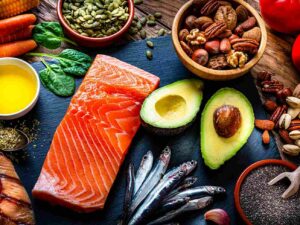Do you want to know how to lose weight fast? You’re in luck! In this blog post, we will discuss how to lose weight quickly in a comprehensive way. Some of these methods are more effective than others, but they will all help you shed those unwanted pounds. So without further ado, let’s get started!
Contents
How To Lose Weight
Here are 9 simple but effective ways to lose weight fast, and start feeling great:
Increase Your Protein Intake
 Protein is essential for muscle repair and growth, which helps promote weight loss because it preserves lean muscle mass while allowing you to burn fat. Additionally, research has shown that high-protein diets help increase feelings of fullness after meals and can decrease hunger cravings throughout the day. When trying to lose weight, it is important to include enough protein in your diet.
Protein is essential for muscle repair and growth, which helps promote weight loss because it preserves lean muscle mass while allowing you to burn fat. Additionally, research has shown that high-protein diets help increase feelings of fullness after meals and can decrease hunger cravings throughout the day. When trying to lose weight, it is important to include enough protein in your diet.
Here are 10 tips for increasing your protein intake:
- Choose High-Protein Foods: Add more high-protein foods to your diets such as eggs, lean meats, legumes, nuts, and seeds.
- Increase Your Portion Sizes: Increase the portion size of high-protein foods to help you reach your protein goals.
- Add Protein to Every Meal: Make sure every meal you eat includes some form of protein.
- Include Protein Snacks: Having a high-protein snack between meals can help you stay full and reduce hunger cravings.
- Make Protein Shakes: Making homemade protein shakes is a great way to get in extra protein throughout the day.
- Try Different Types of Protein: Try different types of proteins such as plant-based proteins, eggs, fish, and dairy.
- Add Protein to Smoothies: Try adding a scoop of protein powder to your smoothies for an extra protein boost.
- Buy Protein Bars: Having protein bars on hand can be a great way to get in an extra protein boost when you’re short on time.
- Try High-Protein Recipes: Look for recipes that are high in protein and incorporate them into your meals.
- Track Your Protein Intake: Keep track of your protein intake to ensure you are reaching your daily protein goals.
Increase Your Fiber Intake
Fiber is an important part of any diet. It helps keep your digestive system healthy, can help you feel full longer, and can even help reduce cholesterol levels. Increasing your fiber intake can also help with weight loss by making it easier to stick to a calorie-deficit diet.
Here are 10 tips for increasing your fiber intake:
- Eat More Fruits and Vegetables: Fruits and vegetables contain high amounts of dietary fiber, so adding more to your diet can be a great way to increase your intake.
- Choose Whole-Grain Products: Choose whole-grain products such as oats, quinoa, barley, and brown rice to increase your fiber intake.
- Add Legumes to Your Meals: Adding legumes such as lentils, beans, or chickpeas can help boost your fiber intake.
- Try High-Fiber Snacks: Having high-fiber snacks between meals can help you stay full and reduce hunger cravings.
- Eat More Nuts and Seeds: Adding nuts and seeds to your diet can help increase your fiber intake.
- Include High-Fiber Cereals: Look for cereals that are high in fiber and try adding them to your morning routine.
- Add Flaxseed or Chia Seeds: Try adding flaxseed or chia seeds to your meals for an extra fiber boost.
- Track Your Fiber Intake: Tracking your dietary fiber will help you stay on track and make sure you are reaching your daily goals.
- Drink Plenty of Water: Make sure you drink enough water throughout the day to help aid in digestion and absorption of dietary fiber.
- Look for High-Fiber Recipes: Look for recipes that are high in fiber and incorporate them into your diet.
Eat Healthy Fats
 Healthy fats can be an important part of a balanced diet and can help you lose weight by keeping you full longer and reducing hunger cravings. Eating healthy fats can also help to improve cholesterol levels and reduce the risk of heart disease.
Healthy fats can be an important part of a balanced diet and can help you lose weight by keeping you full longer and reducing hunger cravings. Eating healthy fats can also help to improve cholesterol levels and reduce the risk of heart disease.
Here are 10 tips for adding more healthy fats to your diet:
- Choose Monounsaturated Fats: Try to incorporate foods that contain monounsaturated fats such as olive oil, avocados, nuts, and seeds.
- Use Healthy Oils: Use healthy oils such as olive oil or coconut oil when cooking instead of butter or margarine.
- Include Healthy Fish: Eating fatty fish such as salmon, mackerel, and tuna can be a great way to get in some healthy fats.
- Add Nuts and Seeds: Nuts and seeds such as almonds, cashews, and chia seeds are an easy way to add healthy fats to your diet.
- Include Avocados: Adding avocados to salads or toast can help increase your intake of healthy fats.
- Choose Low-Fat Dairy Products: Opt for low-fat dairy products such as skim milk or Greek yogurt to get in some healthy fats without the extra calories.
- Eat Plant-Based Fats: Eating plant-based fats such as olives, hummus, and peanut butter can help you increase your intake of healthy fats.
- Try Coconut Milk: If you’re looking for a dairy-free alternative, try coconut milk. It’s a great source of healthy fats.
- Track Your Fat Intake: Keeping track of your fat intake can help you make sure you are getting enough of the right types of fats in your diet.
- Look for Fats in Recipes: Try to incorporate recipes that contain healthy fats into your meals. This can help you increase your intake without thinking about it too much.
Get Enough Sleep
Getting enough sleep is essential for physical and mental health. Not getting enough sleep can lead to various health problems, such as increased stress levels and a weakened immune system. Here are 10 tips for getting the best night’s sleep:
- Set a Bedtime Routine: Have a consistent bedtime routine that helps you relax before going to bed.
- Avoid Stimulants Before Bed: Avoid caffeine and other stimulants close to bedtime to help your body relax and prepare for sleep.
- Exercise Regularly: Exercise can help improve your overall quality of sleep by helping you fall asleep faster and stay asleep longer.
- Limit Screen Time Before Bed: Limiting screen time before bed can help reduce distractions and make it easier to fall asleep when it’s time for bed.
- Establish a Bedroom Environment: Create an environment that is conducive to sleep by keeping your bedroom cool, dark, and quiet.
- Avoid Eating Late at Night: Eat dinner earlier in the evening rather than late at night so you have time to digest before going to bed.
- Limit Alcohol Consumption: Drinking alcohol can disrupt your sleep cycle so try to limit alcohol consumption close to bedtime.
- Take Power Naps During the Day: Taking power naps during the day can help recharge your batteries and prepare you for a better night’s sleep.
- Try Relaxation Techniques: Relaxation techniques such as yoga, meditation, or deep breathing can help relax your body and mind before bedtime.
- Talk to Your Doctor: If you are having trouble sleeping, talk to your doctor and they may be able to recommend treatments or therapies that can help.
Drink Enough Water
 Drinking enough water is essential for a healthy body and mind. Not drinking enough water can lead to dehydration, which can cause fatigue, headaches, and other health issues. Here are 10 tips for getting enough water:
Drinking enough water is essential for a healthy body and mind. Not drinking enough water can lead to dehydration, which can cause fatigue, headaches, and other health issues. Here are 10 tips for getting enough water:
- Set a Goal: Set a goal for how much water you want to drink each day and make sure to track your progress.
- Drink Water With Meals: Make sure to drink a glass of water with each meal to help you stay hydrated.
- Carry a Refillable Water Bottle: Having a refillable water bottle with you throughout the day can help remind you to drink up.
- Add Flavorings: If you don’t like the taste of plain water, try adding some flavorings such as fruit or herbs to make it more palatable.
- Eat More Fruits and Vegetables: Eating more fruits and vegetables can help add to your water intake as these foods contain a lot of water.
- Drink Water Before and After Exercise: Make sure to drink plenty of water before, during, and after exercise to stay hydrated.
- Monitor Your Urine Color: The color of your urine can be a good indicator of how hydrated you are, so make sure to check it often.
- Track Your Progress: Keeping track of how much water you drink each day can help ensure that you meet your daily goals.
- Have Water Nearby: Keep a glass of water nearby at all times to make it easier to remember to drink it.
- Listen to Your Body: Pay attention to your body and if you feel thirsty, make sure to drink some water right away.
Reduce Stress
Reducing stress is important for both physical and mental health. Having excessive amounts of stress can lead to anxiety, depression, and other health issues.
Here are 10 tips for reducing stress:
- Take Time for Yourself: Make sure to take time for yourself each day to relax and do something you enjoy.
- Exercise: Exercise can help reduce stress levels by releasing endorphins which can boost your mood.
- Eat Healthy: Eating a healthy and balanced diet can help you feel better physically and emotionally.
- Practice Mindfulness: Practicing mindfulness can help you become more aware of your thoughts and feelings and can help reduce stress.
- Get Enough Sleep: Make sure to get enough sleep each night so that your body and mind can rest and recharge.
- Connect with Others: Spending time with friends and family can help reduce your stress levels and give you a sense of support.
- Reduce Caffeine Intake: Too much caffeine can increase stress levels, so make sure to keep your intake of caffeinated beverages to a minimum.
- Take Breaks During the Day: Taking regular breaks during the day can help reduce stress levels and give you time to relax.
- Talk to a Professional: Talking to a therapist or counselor may help if you are having trouble managing your stress levels.
- Do Something Creative: Doing something creative such as painting or writing can help reduce stress and boost your mood.
Get Regular Exercise
 Getting regular exercise is essential for a healthy body and mind. Exercise can help reduce stress, improve mood, and boost energy levels. It can also help you lose weight and keep it off.
Getting regular exercise is essential for a healthy body and mind. Exercise can help reduce stress, improve mood, and boost energy levels. It can also help you lose weight and keep it off.
Here are 10 tips to get the most out of your workouts:
- Start Slow: Don’t try to do too much too soon. Start with a few minutes of exercise and gradually increase the amount and intensity as your fitness level improves.
- Set Goals: Setting realistic goals can help keep you motivated and on track with your workouts.
- Find Activities You Enjoy: Choose activities that you enjoy so that you’ll look forward to your workouts.
- Mix It Up: Variety is key when it comes to exercise, so try different activities and routines to keep things interesting.
- Track Your Progress: Using a journal or workout tracker can help you measure your progress and stay motivated.
- Take Rest Days: Make sure to allow your body time to rest and recover between workouts.
- Incorporate Strength Training: Adding strength training to your workout routine can help improve muscle tone, weight loss, and overall fitness.
- Warm-Up/Cool Down: Always make sure to warm up and cool down before and after each workout session.
- Drink Plenty of Water: Staying hydrated is important for both physical and mental health, so make sure to drink plenty of water before, during, and after each workout.
- Listen to Your Body: Pay attention to how your body feels during exercise and stop if you ever experience any pain or discomfort.
Eat a Balanced Diet
Eating a balanced diet is essential for good health and well-being. Eating a variety of nutrient-rich foods can help ensure that your body gets all the nutrients it needs to stay healthy.
Here are 10 tips for eating a balanced diet:
- Eat a Variety of Foods: Choose fruits, vegetables, whole grains, lean proteins, and healthy fats to ensure that you’re getting all the essential nutrients your body needs.
- Monitor Your Portion Sizes: Eat smaller portions so that you don’t overeat and make sure to include snacks throughout the day to keep your energy levels up.
- Avoid Processed Foods: Eating too many processed foods can lead to weight gain, so try to avoid them as much as possible when choosing meals and snacks.
- Plan Ahead: Planning ahead for meals and snacks can help you stay on track with your diet and prevent unhealthy cravings from taking over.
- Read Labels: Reading food labels can help you make informed decisions about what you’re eating and allow you to choose healthier options.
- Limit Sugar Intake: Eating too much sugar can lead to weight gain and other health problems, so try to limit your intake as much as possible.
- Eat More Plant-Based Foods: Increasing your intake of plant-based foods such as fruits, vegetables, grains, nuts, and legumes is a great way to ensure that you get all the essential nutrients your body needs.
- Choose Healthy Fats: Eating healthy fats such as olive oil, avocados, nuts, and seeds can help keep your heart healthy and boost energy levels.
- Drink Plenty of Water: Staying hydrated can help keep your body functioning properly and prevent dehydration.
- Enjoy Your Food: Eating should be a pleasurable experience, so take the time to savor your meals and enjoy them without guilt or stress.
Avoid Processed Foods
 Processed foods are often packed with unhealthy ingredients that can have a negative effect on your health. Try to avoid processed foods as much as possible and focus on eating fresh, whole foods instead.
Processed foods are often packed with unhealthy ingredients that can have a negative effect on your health. Try to avoid processed foods as much as possible and focus on eating fresh, whole foods instead.
Here are some tips for avoiding processed foods:
- Shop the Perimeter: When you’re at the grocery store, stick to the perimeter where most of the fresh foods are located.
- Prepare Meals Ahead of Time: When you’re short on time, prepare meals ahead of time and store them in the freezer for easy access.
- Focus on Natural Sources: Choose natural sources of food such as fruits, vegetables, lean proteins, and healthy fats to ensure that you’re getting all the essential nutrients your body needs.
- Avoid Pre-Packaged Snacks: Pre-packaged snacks can contain a lot of added sugar and unhealthy ingredients, so try to avoid them as much as possible.
Conclusion
Maintaining a healthy lifestyle is key to good health and well-being. Eating a balanced diet and exercising regularly is essential for improving your physical fitness, mental health, and overall quality of life. To get the most out of your workouts and nutrition plan, set realistic goals, mix up your activities, track progress, take rest days, incorporate strength training, warm up and cool down, drink plenty of water, listen to your body, and eat a balanced diet. Following these guidelines can help you stay on track with your health and fitness goals and lead a happier, healthier life.
Consider contacting FitMantra for additional information on nutrition and fitness. You can also get in touch with their nutrition experts through our online nutrition counseling, who can guide you through the process and help you achieve your fitness goals. You can also lose weight with the help of our weight loss program. Download our Fitness app on Android to learn more about us.
